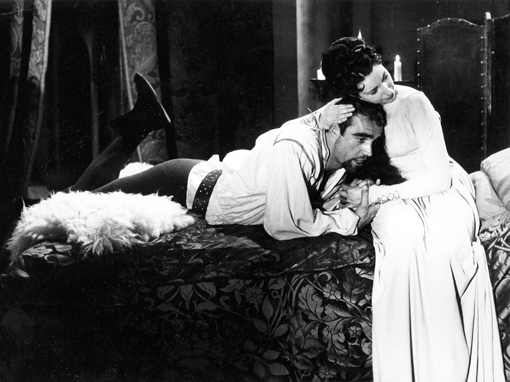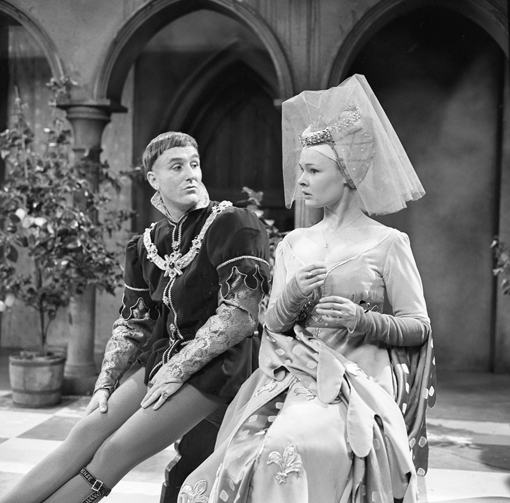Shakespeare live from Shepherd’s Bush,and from Stratford-upon-Avon
 About the author: John Wyver is a writer and producer with Illuminations (www.illuminationsmedia.co.uk/), Senior Research Fellow at the University of Westminster and Media Associate with the Royal Shakespeare Company. He is a historian of television with a particular interest in broadcasting, film and the arts, and he is currently Principal Investigator for the AHRC-funded research project Screen Plays (2011-15). His work as a producer and director has been honoured with a BAFTA, an International Emmy and a Peabody Award. He has produced a series of notable performance films for television, including Richard II (1997) with Fiona Shaw; Macbeth (2000), with Antony Sher and Harriet Walter; Hamlet (2008) with David Tennant; and Macbeth (2009) with Patrick Stewart. In 2013 he produced the RSC's first live-to-cinema broadcast, which brought Gregory Doran's production of Richard II with David Tennant to more than 370 UK cinemas.
About the author: John Wyver is a writer and producer with Illuminations (www.illuminationsmedia.co.uk/), Senior Research Fellow at the University of Westminster and Media Associate with the Royal Shakespeare Company. He is a historian of television with a particular interest in broadcasting, film and the arts, and he is currently Principal Investigator for the AHRC-funded research project Screen Plays (2011-15). His work as a producer and director has been honoured with a BAFTA, an International Emmy and a Peabody Award. He has produced a series of notable performance films for television, including Richard II (1997) with Fiona Shaw; Macbeth (2000), with Antony Sher and Harriet Walter; Hamlet (2008) with David Tennant; and Macbeth (2009) with Patrick Stewart. In 2013 he produced the RSC's first live-to-cinema broadcast, which brought Gregory Doran's production of Richard II with David Tennant to more than 370 UK cinemas.
In November last year I produced the Royal Shakespeare Company’s live cinema broadcast of Richard II from Stratford-upon-Avon. State-of-the-art digital cameras and satellite systems took Gregory Doran’s production with David Tennant to more than 380 cinemas across Britain. Also in November my independent production company Illuminations released as a 5-disc DVD box-set the BBC’s 1960 live studio staging of Richard II, along with the seven other History plays in the series An Age of Kings. Fifty-three years separated the two productions, although the similarities are perhaps as striking as the significant differences.
An Age of Kings was a ground-breaking television event in the summer and autumn of 1960. As Britain celebrated the marriage of Princess Margaret and as The Beatles played their first gigs in Germany, BBC Television broadcast a production of William Shakespeare’s eight History plays in fifteen live episodes shown fortnightly on Thursday evenings. It remains the only occasion when a single company and production team has taken on for television all eight of Shakespeare’s major History plays. The series retains a clarity and an immediacy, a sense of scale, a narrative power and a poetic depth that is unparalleled.
Each play from Richard II to Richard III, including also both Henry IV plays, Henry V and the three parts of Henry IV, was allotted two episodes, between 60 and 75 minutes in length, excepting only Henry VI, Part One, which was confined to a single programme. Writing in The Guardian, television critic Mary Crozier praised this ‘tremendous project’ as ‘ambitious… exciting… a striking example of the creative use of television.’ By presenting the eight plays in fifteen fortnightly episodes, An Age of Kings focuses attention on the links between them and effectively renders them as a television serial, giving greater emphasis to the overlapping and continuing roles of characters and issues. The episodes were watched regularly by more than three million viewers in Britain.
An Age of Kings was repeated by the BBC only once, between January and April 1962, and for more than fifty years it has been unavailable in Britain. Television drama from those days inevitably looks very different from today’s Doctor Who or Downton Abbey. Screens were squarer and the 405-line images (as opposed to the 1080 lines of today’s HD) were in black and white. It was also a time when far less emphasis was placed by producers on editing and single camera shots often developed within a set, at times for ten minutes and more. There was the space for vivid performances of great depth, and for acting of precision and intelligence.
Watching An Age of Kings now certain allowances need to be made for its cramped studio settings and the moments when scenes – especially those of the battles - seem under-populated. Yet the series remains an involving and compelling account of Shakespeare’s great national pageant. It is distinguished a rigorous approach to the text, by Michael Hayes’ frequently inventive direction and by numerous performances of note, including from Robert Hardy. Eileen Atkins, Judi Dench and Sean Connery.

Before An Age of Kings no theatre company in Britain had attempted to present all eight plays as a single, coherent narrative. Richard II, both parts of Henry IV, Henry V and Richard III were all long-established as individual Shakespeare favourites, although the Henry VI trilogy was little-played even in the middle of the twentieth century. The first significant modern production of these plays was by Douglas Seale with the innovative Birmingham Repertory Theatre in the 1950s. The producer of An Age of Kings Peter Dews worked with the Birmingham company on other productions and there is no doubt that these stagings influenced his television epic.
After joining the BBC Peter Dews mounted Henry V for television in December 1957, and the success of that production was a key factor in persuading the BBC that the whole cycle might be presented. Head of drama Michael Barry secured a substantial budget and a regular company of more than thirty actors was assembled by Peter Dews to begin rehearsals in Shepherds Bush in the spring of 1960.
Once the broadcasts began, the actors had four days to learn their lines for the following episode, after which there were rehearsals from the following Tuesday for a week. On the day before the broadcast there were camera rehearsals and on the day itself there were more camera rehearsals from 2pm to 7pm, a two-hour break and the live performance at 9pm. It was planned for the drama to be broadcast from a studio at the new Television Centre in Shepherd’s Bush, but the facilities were not ready in April and the first episodes were transmitted from Hammersmith’s Riverside Studios. To conjure up the visuals director Michael Hayes had four cameras and occasional use of a crane.
So why did the BBC mount such an ambitious and expensive production – and why did it do so in 1960? In the late 1950s the Corporation was feeling the full effects of competition from the still-new commercial service ITV, which began in 1955. Its aggressively populist, entertainment-led schedule was attracting the majority viewers away from the more traditional BBC. Not that a cycle of Shakespeare's history plays would do much to counter that -- but there were other considerations in play.

By 1958, when An Age of Kings was under discussion, it was clear that the Conservative government (which was to be re-elected the following year) was planning a new commission to consider the future of broadcasting. Central to this would be the terms under which the BBC would continue to receive its licence fee, and also the possible provision of a third television channel. The BBC desperately wanted to secure any new service -- which it did in the wake of the Pilkington Report, eventually published in June 1962. BBC2, with an emphasis on the arts, on education and minority interests, was launched in 1964.
What better demonstration could there be of the BBC's capacities than an ambitious series of Shakespeare dramas? Especially when it distinguished the Corporation from the downmarket ITV which, seemingly, would never mount such a venture. An Age of Kings was in part at least addressed to a narrow audience of opinion formers who would shape the Pilkington Report. It succeeded brilliantly, because the Corporation was widely praised by Pilkington while the programmes of the ITV companies were castigated.
Over the past three years I have been working with my colleague Dr Amanda Wrigley on the AHRC-funded research project Screen Plays. Our key focus is the creation of a database of information about all of the 3,000-plus British television productions of plays originally written for the theatre (see the previous Viewfinder article here) We are also engaged in developing critical approaches for and extending access to archival recordings of these plays, and the DVD release of An Age of Kings has been a productive partnership with Illuminations. To achieve this, we had to knock persistently on the doors of BBC Worldwide for more than two years. Illuminations also had to find a substantial advance payment, although everyone expects the release will cover its costs over three years. We hope, too, to follow An Age of Kings with further releases of classic stage plays.
The timing of the publication of An Age of Kings close to Richard II Live from Stratford-upon-Avon was coincidental. But the appearance of both allowed a close comparison of performance styles more than five decades apart. Taken together, the two productions demonstrated the myriad ways in which image and sound technologies have advanced since 1960. The RSC’s Richard II was broadcast from a theatre not a studio, and was shown to audiences watching collectively in cinemas rather than experiencing the drama with just their families at home. But the multi-camera techniques for exploring and enhancing the action were essentially the same, and both broadcasts were live, with all of the energy and jeopardy that this brings to a transmission. Both also took the play simultaneously to audiences across Britain, many of whom had never watched a Shakespeare play before. And both productions were, at heart, realisations by highly skilled actors and creative teams of some of the most beautiful English poetry ever written.
John Wyver
Screen Plays http://screenplaystv.wordpress.com/
RSC Live from Stratford-upon-Avon http://onscreen.rsc.org.uk/ Henry IV part one is broadcast on 14 May, and Henry IV, part two on 18 June
An Age of Kings can be purchased from Illuminations and from Moviemail, Amazon and other online retailers.